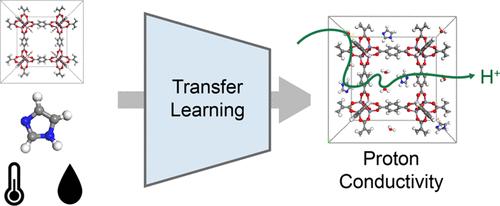当前位置:
X-MOL 学术
›
Chem. Mater.
›
论文详情
Our official English website, www.x-mol.net, welcomes your
feedback! (Note: you will need to create a separate account there.)
Machine Learning-Based Prediction of Proton Conductivity in Metal–Organic Frameworks
Chemistry of Materials ( IF 7.2 ) Pub Date : 2024-11-06 , DOI: 10.1021/acs.chemmater.4c02368 Seunghee Han, Byoung Gwan Lee, Dae-Woon Lim, Jihan Kim
Chemistry of Materials ( IF 7.2 ) Pub Date : 2024-11-06 , DOI: 10.1021/acs.chemmater.4c02368 Seunghee Han, Byoung Gwan Lee, Dae-Woon Lim, Jihan Kim

|
Recently, metal–organic frameworks (MOFs) have demonstrated their potential as solid-state electrolytes in proton exchanged membrane fuel cells. However, the number of MOFs reported to exhibit proton conductivity remains limited, and the mechanisms underlying this phenomenon have not been fully elucidated, complicating the design of proton-conductive MOFs. In response, we developed a comprehensive database of proton-conductive MOFs and applied machine learning techniques to predict their proton conductivity. Our approach included the construction of both descriptor-based and transformer-based models. Notably, the transformer-based transfer learning (Freeze) model performed the best with a mean absolute error (MAE) of 0.91, suggesting that the proton conductivity of MOFs can be estimated within 1 order of magnitude using this model. Additionally, we employed feature importance and principal component analysis to explore the factors influencing the proton conductivity. The insights gained from our database and machine learning model are expected to facilitate the targeted design of proton-conductive MOFs.
中文翻译:

基于机器学习的金属-有机框架中质子电导率预测
最近,金属有机框架 (MOF) 已证明其作为质子交换膜燃料电池中固态电解质的潜力。然而,据报道表现出质子电导性的 MOF 数量仍然有限,并且这种现象的潜在机制尚未完全阐明,这使得质子导电 MOF 的设计复杂化。作为回应,我们开发了一个质子导电 MOF 的综合数据库,并应用机器学习技术来预测它们的质子电导率。我们的方法包括构建基于描述符和基于转换器的模型。值得注意的是,基于变压器的迁移学习 (Freeze) 模型表现最好,平均绝对误差 (MAE) 为 0.91,这表明使用该模型可以在 1 个数量级内估计 MOF 的质子电导率。此外,我们采用特征重要性和主成分分析来探索影响质子电导率的因素。从我们的数据库和机器学习模型中获得的见解有望促进质子传导 MOF 的靶向设计。
更新日期:2024-11-07
中文翻译:

基于机器学习的金属-有机框架中质子电导率预测
最近,金属有机框架 (MOF) 已证明其作为质子交换膜燃料电池中固态电解质的潜力。然而,据报道表现出质子电导性的 MOF 数量仍然有限,并且这种现象的潜在机制尚未完全阐明,这使得质子导电 MOF 的设计复杂化。作为回应,我们开发了一个质子导电 MOF 的综合数据库,并应用机器学习技术来预测它们的质子电导率。我们的方法包括构建基于描述符和基于转换器的模型。值得注意的是,基于变压器的迁移学习 (Freeze) 模型表现最好,平均绝对误差 (MAE) 为 0.91,这表明使用该模型可以在 1 个数量级内估计 MOF 的质子电导率。此外,我们采用特征重要性和主成分分析来探索影响质子电导率的因素。从我们的数据库和机器学习模型中获得的见解有望促进质子传导 MOF 的靶向设计。


















































 京公网安备 11010802027423号
京公网安备 11010802027423号